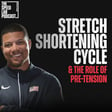
Stuart McMillan: Strength Training, Braking Forces, Sprinting
Universal Speed Rating is excited to announce the launch of The Speed Lab Podcast with hosts Les Spellman, Danny Foley, and Cici Murray.
In this episode, Les and Danny sit down with Stuart McMillan, Co-Founder and CEO of ALTIS, a globally recognized leading authority in sports education, specializing in coaching excellence for speed, power, and strength training, across Track and Field, and Team Sports.
Interested in learning more about the Universal Speed Rating? Click here to schedule a quick call with our team.
00:00:00 Introduction to Guests and Themes
00:01:08 Training Seasons and Athlete Management
00:02:00 Evolving Beliefs in Coaching
00:05:56 Complexity in Coaching Systems
00:13:12 Leadership and Complexity in Systems
00:21:00 Consulting Challenges in Sports
00:34:53 Career Evolutions and Personal Insights
00:51:18 Innovative Training Approaches
01:07:32 Understanding Complexity in Coaching
01:26:03 Book Discussion and Personal Reflections
01:28:05 Upcoming Event Highlights
01:37:21 Conclusion and Future Anticipations










